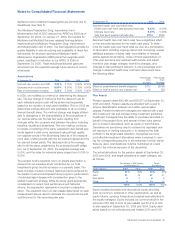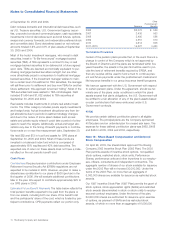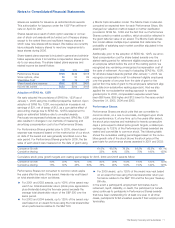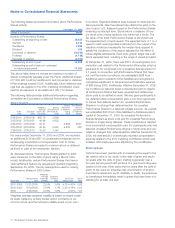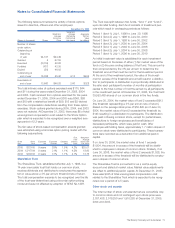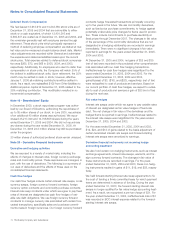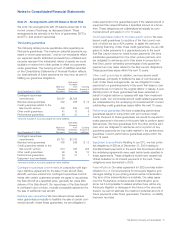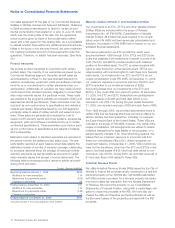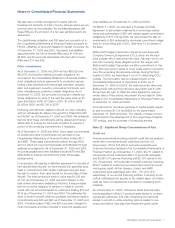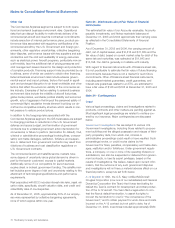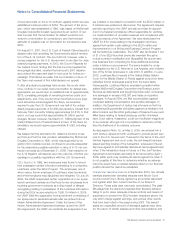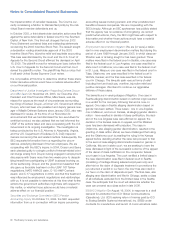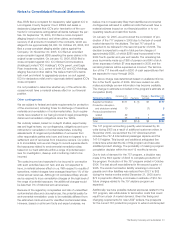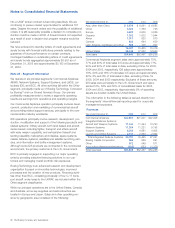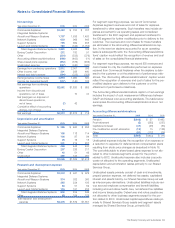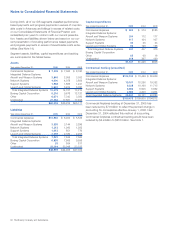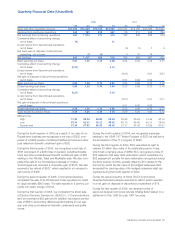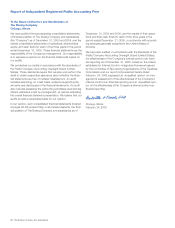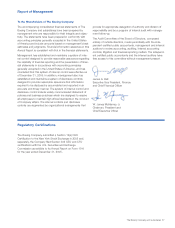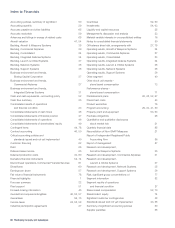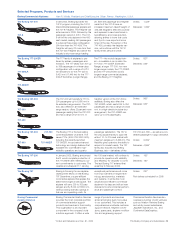Boeing 2005 Annual Report Download - page 81
Download and view the complete annual report
Please find page 81 of the 2005 Boeing annual report below. You can navigate through the pages in the report by either clicking on the pages listed below, or by using the keyword search tool below to find specific information within the annual report.Notes to Consolidated Financial Statements
of recorded costs on the A-12 contract, against which we have
established a loss provision of $350. The amount of the provi-
sion, which was established in 1990, was based on McDonnell
Douglas Corporation’s belief, supported by an opinion of out-
side counsel, that the termination for default would be con-
verted to a termination for convenience, and that the best
estimate of possible loss on termination for convenience was
$350.
On August 31, 2001, the U.S. Court of Federal Claims issued a
decision after trial upholding the Government’s default termina-
tion of the A-12 contract. The court did not, however, enter a
money judgment for the U.S. Government on its claim for unliq-
uidated progress payments. In 2003, the Court of Appeals for
the Federal Circuit, finding that the trial court had applied the
wrong legal standard, vacated the trial court’s 2001 decision
and ordered the case sent back to that court for further pro-
ceedings. This follows an earlier trial court decision in favor of
the Team and reversal of that initial decision on appeal.
If, after all judicial proceedings have ended, the courts deter-
mine, contrary to our belief, that a termination for default was
appropriate, we would incur an additional loss of approximately
$275, consisting principally of remaining inventory costs and
adjustments, and, if the courts further hold that a money judg-
ment should be entered against the Team, we would be
required to pay the U.S. Government one-half of the unliqui-
dated progress payments of $1,350 plus statutory interest from
February 1991 (currently totaling approximately $1,210). In that
event, our loss would total approximately $1,548 in pre-tax
charges. Should, however, the March 31, 1998 judgment of the
United States Court of Federal Claims in favor of the Team be
reinstated, we would receive approximately $1,026, including
interest.
We believe that the termination for default is contrary to law
and fact and that the loss provision established by McDonnell
Douglas Corporation in 1990, which was supported by an
opinion from outside counsel, continues to provide adequately
for the reasonably possible reduction in value of A-12 net con-
tracts in process as of December 31, 2005. Final resolution of
the A-12 litigation will depend upon the outcome of further pro-
ceedings or possible negotiations with the U.S. Government.
EELV litigation In 1999, two employees were found to have in
their possession certain information pertaining to a competitor,
Lockheed, under the EELV Program. The employees, one of
whom was a former employee of Lockheed, were terminated
and a third employee was disciplined and resigned. On July 24,
2003, the USAF suspended certain organizations in our space
launch services business and the three former employees from
receiving government contracts as a direct result of alleged
wrongdoing relating to possession of the Lockheed information
during the EELV source selection in 1998. On March 4, 2005,
the USAF lifted the suspension from government contracting of
our space launch services business after we entered into an
Interim Administrative Agreement. Under the terms of the
Interim Administrative Agreement between us and the USAF
(the Agreement), the USAF can reinstate the suspension if we
are indicted or convicted in connection with the EELV matter, or
if material new evidence is discovered. The Agreement requires
periodic reporting to the USAF and also provides for appoint-
ment of a Special Compliance Officer responsible for verifying
our implementation of remedial measures and compliance with
other provisions of the Agreement. We have reimbursed the
USAF $1.9 for costs relating to its investigation and have
agreed that certain costs relating to the EELV matter and
improvements to our Ethics and Business Conduct Program
will be treated as unallowable. The USAF also terminated 7 out
of 21 of our EELV launches previously awarded through a
mutual contract modification and disqualified the launch serv-
ices business from competing for three additional launches
under a follow-on procurement. The same incident is under
investigation by the U.S. Attorney in Los Angeles, who indicted
two of the former employees in July 2003. In addition, in June
2003, Lockheed filed a lawsuit in the United States District
Court for the Middle District of Florida against us and the three
individual former employees arising from the same facts.
Subsequently, Lockheed filed an amended complaint which
added McDonnell Douglas Corporation and Boeing Launch
Services as defendants and sought injunctive relief, compensa-
tory damages in excess of $2,000 and treble and punitive
damages. In August 2004, we filed counterclaims against
Lockheed seeking compensatory and punitive damages. In
addition, the Department of Justice has informed us that it is
considering filing potential civil claims against us relating to the
EELV incident and the 2004 guilty pleas of Darlene Druyun and
Mike Sears relating to federal employee conflict-of-interest
laws. Such claims, if asserted, could be of sufficient magnitude
to be material, although it is not possible to determine at this
time the likelihood of an adverse outcome.
As discussed in Note 12, on May 2, 2005, we entered into a
Joint Venture Agreement with Lockheed to provide launch serv-
ices to the U.S. Government. Pursuant to the terms of the Joint
Venture Agreement and court order, the civil lawsuit has been
stayed pending closing of the transaction, whereupon the par-
ties have agreed to immediately dismiss all claims against each
other. If the transaction does not close or if the Joint Venture
Agreement is terminated according to its terms before April 1,
2006, either party may reinstate its claims against the other. It
is not possible at this time to determine whether an adverse
outcome would have a material adverse effect on our financial
position should the claims be reinstated.
Shareholder derivative lawsuits In September 2003, two virtually
identical shareholder derivative lawsuits were filed in Cook
County Circuit Court, Illinois, against us as nominal defendant
and against each then current member of our Board of
Directors. These suits have now been consolidated. The plain-
tiffs allege that the directors breached their fiduciary duties in
failing to put in place adequate internal controls and means of
supervision to prevent the EELV incident described above, the
July 2003 charge against earnings, and various other events
that have been cited in the press during 2003. The lawsuit
seeks an unspecified amount of damages against each direc-
tor, the return of certain salaries and other remunerations and
The Boeing Company and Subsidiaries 79


